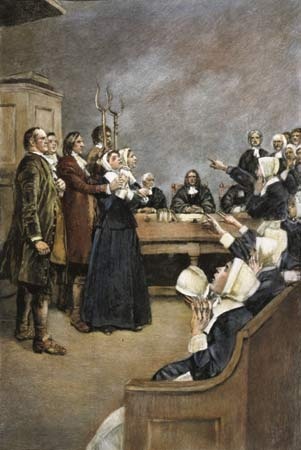Salem witch trials
American history
 (May–October 1692), in American history, a series of investigations and persecutions that caused 19 convicted “witches” to be hanged and many other suspects to be imprisoned in the town of Salem in the Massachusetts Bay Colony. Stimulated by voodoo tales told by a West Indian slave, Tituba, a few young girls claimed they were possessed by the devil and subsequently accused three Salem women, including Tituba, of witchcraft. As Tituba and other accused persons were pressured and consequently incriminated others in false confessions, public hysteria over the threat of witchcraft mounted throughout Massachusetts.
(May–October 1692), in American history, a series of investigations and persecutions that caused 19 convicted “witches” to be hanged and many other suspects to be imprisoned in the town of Salem in the Massachusetts Bay Colony. Stimulated by voodoo tales told by a West Indian slave, Tituba, a few young girls claimed they were possessed by the devil and subsequently accused three Salem women, including Tituba, of witchcraft. As Tituba and other accused persons were pressured and consequently incriminated others in false confessions, public hysteria over the threat of witchcraft mounted throughout Massachusetts.Civil magistrates, encouraged by the clergy, set up a special court in Salem to try those accused of practicing witchcraft, and Samuel Sewall, John Hathorne, and William Stoughton were chosen as the court's judges. The list of the accused increased (even Massachusetts governor William Phips's wife was implicated) until 150 people had been imprisoned and were awaiting trial. By September, however, the climate of mass hysteria had begun to abate, and public opinion first stopped, and then condemned, the trials. Governor Phips dissolved the special court in October and released the remaining prisoners. The Massachusetts General Court (legislature) later annulled the witch trials' convictions and granted indemnities to the families of those who had been executed.
Additional Reading
Useful sources include Marion L. Starkey, The Devil in Massachusetts: A Modern Enquiry into the Salem Witch Trials (1949, reprinted 1989); and John Demos, Entertaining Satan: Witchcraft and the Culture of Early New England (1982).
- Priscian
- Priscilla Alden, John; and Alden
- Priscilla Kemble
- Priscillian
- Priscus Attalus
- prism
- prison
- prisoner of war
- Pritchard, Sir John
- Pritchett, V.S.
- Prithvi Nārāyaṇ Shah
- Altai Mountains
- Altaisky Nature Reserve
- Altamira
- Altamura
- Altan
- altar
- Altare glass
- altarpiece
- Altay
- Al- Taʿmīm
- Altdorf
- Altdorfer, Albrecht
- Altenburg
- Alte Pinakothek